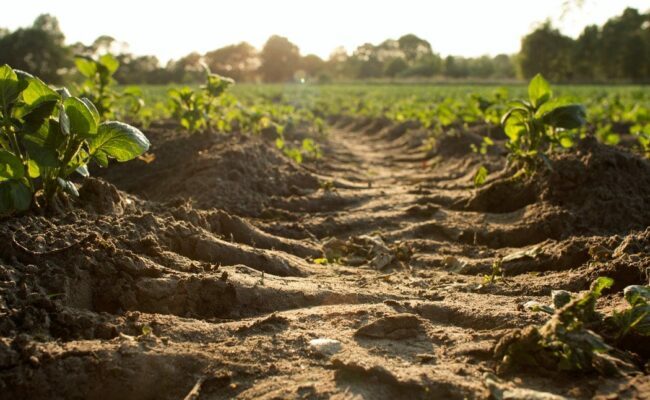
Ahead of the December 5th World Soil Day, experts have raised concern over the pressure on the soil, leading to its depletion, which by implication threatens food security in the face of a surging population.
A document released by the United Nations Food and Agriculture Organisation (FAO), the Soil Science Society of Nigeria, and the Nigeria Institute of Soil Science (NISS) said that in the face of climate change and human activity, the soils are being degraded, putting excessive pressure on water resources.

The document said that sustainable soil management practises, such as minimum tillage, crop rotation, organic matter addition, and cover cropping, improve soil health, reduce erosion and pollution, and enhance water infiltration and storage.
It said these practices also preserve soil biodiversity, improve fertility, and contribute to carbon sequestration, playing a crucial role in the fight against climate change.
Furthermore, the document says the soil is an essential resource and a vital part of the natural environment from which most of the global food is produced.
It was noted that soils are directly and indirectly involved in the provision of most ecosystem services vital for humans, including food production, which is fundamental for food security and sovereignty.
“That is, soil provides living space for humans as well as essential ecosystem services that are important for water regulation and supply, climate regulation, biodiversity conservation, carbon sequestration, and cultural services.
“Soils are directly and indirectly involved in the provision of most ecosystem services vital for humans, including food production, which is fundamental for food security and sovereignty.”
“Soils are the basis for producing more than 95 per cent of our food, according to the analysis of data available in FAOSTAT (FAO, 2022). But soils are under pressure from increases in population, higher demands for food, and competing land uses.
“Over 33 per cent of agricultural land is degraded due to erosion, loss of organic carbon and biodiversity, salinization, acidification, compaction, and nutrient imbalance, among other causes (FAO and ITPS, 2015)”, the document said.
It stated that healthy soils are essential for our survival. They support healthy plant growth to enhance both our nutrition and water percolation to maintain groundwater levels, and they help regulate the planet’s climate by storing carbon. They are the second-largest carbon sink after the oceans.
“They help maintain a landscape that is more resilient to the impacts of droughts and floods. As soil is the basis of food systems, it is no surprise that soil health is critical for healthy food production.
“Basic grains, oilseeds, sugar, vegetables, nuts, and fruits directly rely on soils, and livestock meat and products, such as eggs and dairy products, are supported by animal feeds that also grow in soils. When produced by healthy and fertile soils, these foods are wholesome and nutritious, the document noted.
It said agriculture must return to its roots by rediscovering the importance of healthy soil, drawing on natural sources of plant nutrition, and using mineral fertiliser wisely. Strategies aimed at achieving food security should be based on soil health, which is both a prerequisite and the ultimate goal.
“Soils rich in biota and organic matter are the foundation of increased crop productivity. The best yields are achieved when nutrients come from a mix of mineral fertilisers and natural sources, such as manure and nitrogen-fixing crops and trees.
“Judicious use of mineral fertilisers saves money and ensures that nutrients reach the plant and do not pollute the air, soil, or waterways. Policies to promote soil health should encourage conservation agriculture and mixed crop-livestock and agro-forestry systems that enhance soil fertility.
“They should remove incentives that encourage mechanical tillage and the wasteful use of fertilisers and transfer to farmers precision approaches such as urea deep placement and site-specific nutrient management,” the document added.
YOU SHOULD NOT MISS THESE HEADLINES FROM NIGERIAN TRIBUNE
COP28 delegates: Invest in production, not frivolities, Peter Obi knocks Tinubu
Peter Obi, the presidential candidate of the Labour Party (LP) in the 2023 general elections has reacted to the long list of delegates that travelled with…
I studied for seven hours daily for four years — ACU best graduating student
To attain great academic success, the best-graduating student at Ajayi Crowther University for the 2022–2023 academic session, Susanna Akinteye, has…
CBN will freeze your accounts if you don’t link your BVN-NIN
The Central Bank of Nigeria (CBN) has said that all accounts without the Bank Verification Number (BVN) and…
How housewives are coping with exorbitant cost of pepper
YEJIDE GBENGA-OGUNDARE reports that in addition to significant increase in cost of food items, many Nigerian homes that…
Service chiefs on national security
SPEAKING at the Green Chamber when he led service chiefs to address parliamentarians on pertinent security issues last week, the Chief of…
Gusau outlines 2030 vision for Nigeria football development
President, Nigeria Football Federation (NFF), Ibrahim Musa Gusau, has outlined his plan for…








